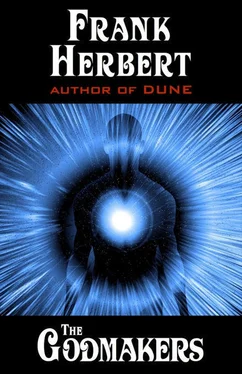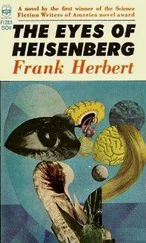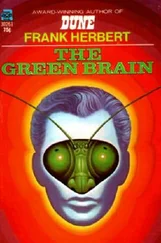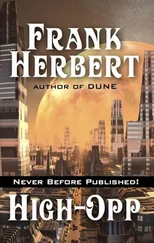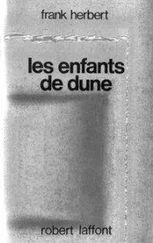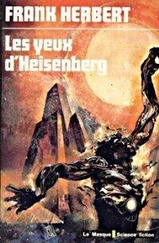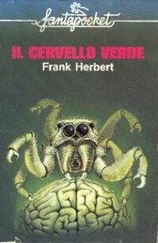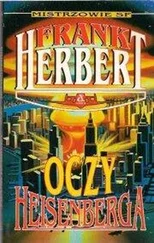Orne saw the image painted by the Abbod’s words, blurted: “It’d be worse than death!”
“An unutterable and deadly boredom would face such a being,” the Abbod agreed. “The future would be an endless repetition, the replaying of all its old records. It would be, as you say, a boredom worse than extinction.”
“But boredom’s a kind of stasis,” Orne said. “That’d break down somewhere and explode into chaos.”
“And where do we poor finite creatures make our existence?” the Abbod asked.
“Surrounded by chaos,” Orne said.
“Immersed in it,” the Abbod said, his old eyelids fluttering. “We live in an infinite system where anything can happen, a place of constant change. Our one absolute: Things change.”
“If anything can happen,” Orne said, “your hypothetical being could be extinguished. Even a god?”
“Quite a price to pay to escape boredom, eh?” the Abbod asked.
“It can’t be that simple,” Orne protested.
“And probably isn’t,” the Abbod agreed. “Another consciousness exists within us which denies extinction. It has been called such things as collective unconscious, the paramatman, Urgrund, Sanatana Dharma, supermind, ober palliat. It has been called many things.”
“Words again,” Orne objected. “The fact that a name exists for something doesn’t mean that thing exists.”
“Good,” the Abbod said. “You do not mistake clear reasoning for correct reasoning. You are an empiricist. Have you ever heard the legend of Doubting Thomas?”
“No.”
“Ahhh,” the Abbod said, “Then a mortal may instruct a god. Thomas is one of my favorite characters. He refused to take crucial facts on faith.”
“He sounds like a wise man.”
“I have always so considered him,” the Abbod said. “He questioned, but he failed to question far enough. Thomas never asked whom the gods worship.”
Orne felt his inner being turned over—one slow revolution. He sensed forces falling into place, concepts, order, chaos, new relationships. It was an explosion of awareness, a blinding light that illuminated infinity for him.
When it passed, he said: “You did not instruct Mahmud.”
“We did not,” the Abbod said, his voice low and sad. “Mahmud escaped us. We may generate gods… prophets, but we are not always in a healthy relationship with them. When they point out the pathways to degeneracy and failure, we may not listen. When they indicate the way out of our blindness, veils fall upon our sight. The results are ever the same.”
Orne spoke, hearing his own voice echo with a terrible resonance in the Abbod’s room: “And even when you follow the way, you achieve only temporary order. You climb toward power and fall into shattering circumstances.”
An inner light glowed from the Abbod’s glossy eyes. He said: “I pray to you, Orne. Have you any count on the number of helpless innocents tortured and maimed in the name of religion during our bloody history?”
“The number is meaningless,” Orne said.
“Why do religions run wild?” the Abbod asked.
“Do you know what happened to me out there tonight?” Orne demanded.
“I knew within minutes of your escape,” the Abbod said. “I pray you not to be angry. Remember, I am the one who summoned you.”
Orne stared at the Abbod, seeing not the flesh but the forces which came to focus there as though pouring through a torn place in a black curtain. “You wanted me to experience and learn the explosive energy within religion,” he said. “Truly, a mortal may instruct a god.” He hesitated. “Or a prophet. You please me, Abbod Hahnyrach.”
Tears poured from the Abbod’s eyes. He said: “Which are you, Orne: god or prophet?”
Orne silenced sensory perception, examined the new relationships, then: “Either, or both… or none of these. One has a choice. I accept your challenge. I will not start a wild new religion.”
“Then what will you do?” the Abbod whispered.
Orne turned, waved a hand. A dancing sword of flame came into being about two meters from his outstretched hand. He aimed its point at the Abbod’s head, saw fear glisten in the old eyes.
“What happened to the first lonely human who tapped this form of energy?” Orne demanded.
“He was burned alive for sorcery,” the Abbod husked. “He did not know how to use the force after calling it into existence.”
“Then it is dangerous to call a force into existence without knowing how to use it,” Orne said. “Do you know what this particular force was called?”
“A salamander,” the Abbod whispered.
“Men thought it was a demon with a life of its own,” Orne said. “But you know more about it than that, don’t you, Reverend Abbod?”
“It’s raw energy,” the Abbod whispered. He drew in a ragged breath, sank back against his pillows.
Orne observed the lapse, infused the Abbod with additional energy.
“Thank you,” the Abbod said. “Sometimes I forget my years, but they do not forget me.”
“You forced me to accept the things I already could do,” Orne said. “I doubted the existence of a superior consciousness which sometimes manifests itself in men, in gods, prophets and machines. But you gave me the test of faith and forced me to have faith in myself.”
“It is thus gods are made,” the Abbod ventured.
Orne recalled the old nightmare—“Gods are made, not born.”
He said: “You should have listened to Thomas. Gods do worship. I summoned Mahmud and Mahmud was not of your making. I caused pain and suffering. In an infinite universe, a god may hate,”
The old man put his hands over his face, moaned: “Ohhh, what have we done? What have we done?”
Orne said: “Psi must be faced with psi.”
By willing it, Orne projected himself into space and alternate dimensions, found a place where psi forces did not distract. Somewhere, there was a great howling of non-sound, but he could ignore it. The thought of blazing seconds ticked within him. TIME!
He juggled symbols like blocks of energy, manipulated energy like discrete signals.
Time and tension: Tension equals energy source. Energy plus opposition equals growth of energy.
To strengthen a thing, oppose it. Growth of energy plus opposition produces (time/time) produces new identities.
Orne whispered soundlessly to TIME. “You become like the worst in what you oppose.”
TIME displayed it for him: The great degenerated into the small, priest slipped into evil…
Somewhere beyond him, Orne sensed chaotic energy flowing. It was a great blankness filled with ceaseless flowing. He felt himself on a mountaintop and there was a mountaintop beneath him. He pressed the living earth with flattened palms.
Thus I have shape , he thought.
A voice came to him from below the mountain. He was being pulled down the mountain, distorted, twisted. Orne resisted the distortion, allowed himself to flow toward the voice. “Blessed is Orne; blessed is Orne…”
It was a persistent chant in the Abbod’s voice. There were others then—Diana, Stetson… a multitude.
“Blessed is Orne…”
Orne saw with senses he created for the purpose, and into dimensions of his own making. Still, he sensed the flowing chaos, knowing that even this might not hold him. One had only to make the proper perception. Veils would fall away.
“Blessed is Orne,” the Abbod prayed.
Orne felt a pang of sympathy for the old man, recognized the awe. It was like Emolirdo’s aborted demonstration—a three-dimensional shadow cast into a two-dimensional universe. The Abbod existed in a thin layer of time. Life projected the Abbod’s matter along that thin dimension.
The Abbod prayed to his God Orne and Orne answered, coming down from the mountaintop, erasing the worship of the multitudes, coming to rest as a physical form cross-legged and seated upon the bed.
Читать дальше
